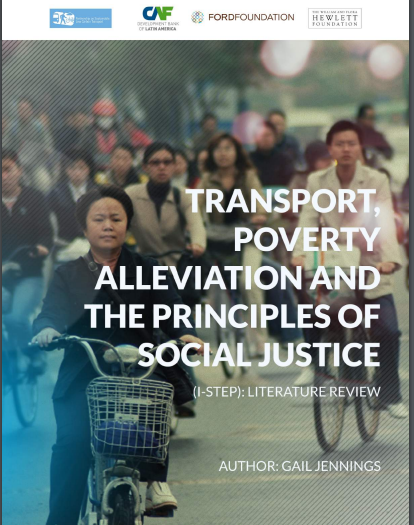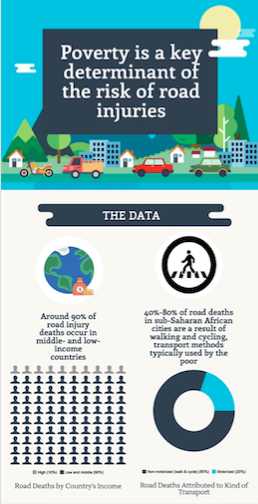SLoCaT's Literature Review Recommends Actions to Move Transport Equity Higher Up the Global Sustainability Agenda
 The Partnership on Sustainable, Low Carbon Transport (SLoCaT) has launched the a Literature Review: Transport, poverty alleviation and the principles of social justice. The Literature Review is one component of a larger SLoCaT project: Sustainable Transport in Support of Action on Equity and Poverty (i-STEP), supported by the Ford Foundation, the Hewlett Foundation, and CAF – Development Bank of Latin America. This review, ‘Sustainable Urban Transport in Support of Action on Equity and Poverty’, builds on an earlier work prepared by SLoCaT, “Poverty and Sustainable Transport” (Starkey & Hine 2014), which included urban poverty but was concerned largely with how transport affects the rural poor.The purpose of this review was to better understand the interest in and arguments advanced regarding transport equity within urban contexts and where possible, in the developing and emerging economies.
The Partnership on Sustainable, Low Carbon Transport (SLoCaT) has launched the a Literature Review: Transport, poverty alleviation and the principles of social justice. The Literature Review is one component of a larger SLoCaT project: Sustainable Transport in Support of Action on Equity and Poverty (i-STEP), supported by the Ford Foundation, the Hewlett Foundation, and CAF – Development Bank of Latin America. This review, ‘Sustainable Urban Transport in Support of Action on Equity and Poverty’, builds on an earlier work prepared by SLoCaT, “Poverty and Sustainable Transport” (Starkey & Hine 2014), which included urban poverty but was concerned largely with how transport affects the rural poor.The purpose of this review was to better understand the interest in and arguments advanced regarding transport equity within urban contexts and where possible, in the developing and emerging economies.
Key Findings:
- The mobility-centered approach to transportation planning needs to be replaced with an accessibility-centered approach
- Accessibility measures still fail to capture the nuances of transport inequity or disadvantage, and are particularly weak in determining what should be measured
- There is a lack of literature assessing the outcome or impact of any increased access, and the contribution of new transport interventions
- Apart from a few isolated studies and attempts at defining basic access, there continues to be insufficient reflection on desired and imagined mobility
- There are token efforts at equity and access in transport policies and projects, often as a response to donor requirements
- The environmental and economic impacts of transport should be considered separately but in association with the social impacts
Conclusion:
Accessibility measures significantly determine how easy it is to access transport services, or to access destinations. The literature review points out that the outcomes of this increased access are rarely evaluated. Even when access to useful destinations is measured, the actual importance or contribution of these destinations is rarely part of the analysis. Thus, we are still not very informed of whether increased accessibility delivers what transport users need.
Computed indices do not sufficiently answer the question of what the poor ‘do’ with this access or mobility, and whether they are able to ‘do’ with it what they really need to do. By noting the gaps in research and practice, this literature review recommends actions to move transport equity higher up the global sustainability agenda.
Building on the research experience, in 2017 SLoCaT Partnership plans to take the i-STEP programme forward. In the second phase (i-STEP 2), SLoCaT plans to produce two outputs (i) an expanded evidence-base and narrative on poverty, equity and inclusiveness for several types of sustainable transport interventions and (ii) comprehensive database documenting current tools and methods to audit accessibility and social impact. The planned schedule of i-STEP 2 is from March 2017 to July 2018.
For more information on the i-STEP Project, please also see:
- Full-text of Literature Review
- Survey based on consultations with SLoCaT Members
- White Paper on Consultations Conducted and Recommendations of the i-STEP Project
Acknowledgement:
The literature review was peer-reviewed by an external team of experts on the topics and SLoCaT Partnership would like to thank our team of external peer-reviewers, Christo Venter, Pablo Salazar Ferro, Todd Litman, Eduardo Alcântara de Vasconcellos, and Dr. Meleckidzedeck Khayesi, for the time they took to share additional references and prepare insightful comments on this document. We would also like to thank the Ford Foundation, the Hewlett Foundation, and CAF – Development Bank of Latin America, for their generous support to develop the literature review.
